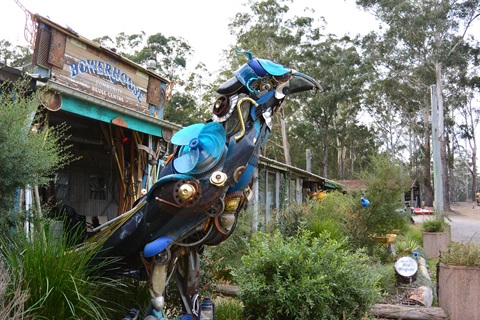Fix it, don't ditch it
Published on 10 October 2024

At the entrance of the Bowerhouse Community Recycling Centre stands a bowerbird. Its body is made of once useful objects: scrap metal, cogs, worn tyres. Here, ‘junk’ is given new life. The bowerbird’s feet are the curled prongs of rusty garden forks. The head of a plastic rake fans out over its breast.
When the Bowerhouse opened its doors thirty years ago, it’s purpose was to recycle building materials that were needlessly ending up in landfill. Since then it’s broadened its focus to the reusability of all products, becoming a hub for thrifting, fixing and up cycling. There’s workshops spread throughout the year, but from Monday to Friday the main attraction is the Bowerhouse op-shop. It’s filled, as you might expect, with community donations; home wares, clothes, furniture. But as the wall of welded bicycles frames indicates, this is no ordinary thrift shop. It’s been built, or rather up cycled around a certain vision, a way of seeing that appreciates the worth in what could otherwise be treated as waste.
Being at the Bowerhouse reminds you that our fixation with whatever is new is itself, actually quite new. Our grandparents were proud menders and fixers; to someone of their generation, extending the life of stuff was simply common sense. Slowly, the ‘waste not, want not’ ethos is creeping back into our lives again. We’re beginning to recognise the value of buying things that last; or fixing what we already have. While saving money, it also helps us tread more lightly on the earth. Essentially, it’s a sustainable version of a two-for-one deal; each time we choose not to buy new, we’re both reducing waste and conserving natural resources.
Besides, who needs new when we’ve got scones and marmalade and the wisdom of our thrifty elders? If waste is merely a failure of imagination, who’s to say that we can’t all be bowerbirds? By recognising the energy, time and resources that go into making our stuff, we can better appreciate the life that’s in it still. It all starts with small, everyday acts of care. And maybe a trip to the Bowerhouse.